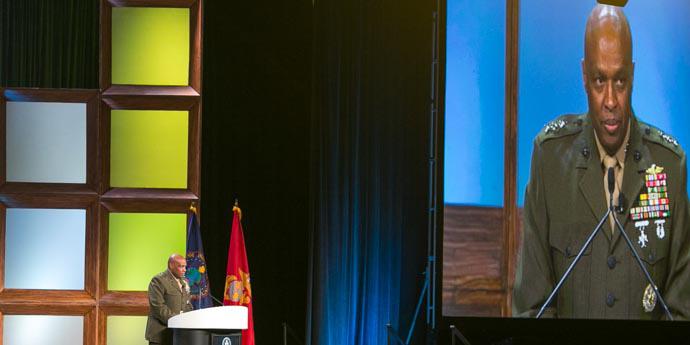Cognitive Warfare Will Be Deciding Factor in Battle
To Lt. Gen. Vincent R. Stewart, USMC, director, Defense Intelligence Agency (DIA), modern warfare is a cognitive battle. To be successful, warfare must strive to control information.
In part, war is still a violent clash between hostile forces, with each force trying to impose their will on the other, the general said. Warfighting may still look like two armies crashing into one another on the battlefield.
“[This] nature of warfare hasn’t changed,” he stated. “War remains an active force to compel an adversary, nothing less.”
These days, however, the battlefield isn’t always physical. “All too often we find ourselves fighting warfare in ways that are not purely kinetic,” Gen. Stewart observed. “We are facing another change in the character of war.”
Wars turn on the ability to make good judgments, to reason. “Simply, put, it is to know what to do and when to do it,” he said. “And if you don’t control information or your decision-making cycle is disrupted, or your cognitive ability is degraded, then you are not able to win or fight effectively.”
Gen. Stewart cautioned forces against having a false sense of security in warfare. “Don’t think that the war you prepared for is the war that you will face,” he warned. “Don’t fight the last war.” The past war—or so-called fourth-generation warfare—he characterized as decentralized warfare, fighting terrorism and ending the nation-states' monopoly on power.
Now, 21st-century warfare is about winning information in the so-called decision space either before or during the conflict. For the general, this is what characterizes fifth-generation warfare. “It is about the fight for information,” Gen. Stewart declared.
To support cognitive warfare and the collection, dissemination, distribution and protection of information, the military needs an impenetrable network. Currently, networks and information systems aren’t resilient enough to survive sustained warfare, the general allowed.
“Potential adversaries are using the information space to wage war at the cognitive level,” the general continued. “And the threats are not going away. They are getting more frequent and more dangerous.”
Gen. Stewart called on U.S. information technology companies to create and build networks that can operate in such an adversarial environment. Future network defense must be resilient, reliable and redundant.
Network functions like firewalls that announce an attack after the damage is done are not effective. “It’s a little too late,” just to have notification of an attack, Gen. Stewart emphasized. “We need to see adversaries before they are in the network.
Literally, this is about protecting everything.”
“Those that win the fight for information will win it all,” the general concluded.
Gen. Stewart shared his views at DIA’s Department of Defense Intelligence Information System (DoDIIS) 2017 Worldwide Conference August 14 in St. Louis.





Comment
Dear Lt. General,
Dear Lt. General,
I strongly believe that knowing the US capabilities is as important to know the capabilities of the enemies of the US, like Rusia, China, and other major actors playing in a chess board.
Anticipation is also a key to win this kind of cyberwarfare.
To understand extreley well how the mind works at the cognitive level, mental process, desicion making, understanding cyberspace is like knowing how the Universe works.
These are just some few measures that I believe that the US should take, some of which I inferred that are being undertaken or in the process of being studied.
My sincere regards,
Pablo Luchetti
Argentinean-American Citizen
Comments